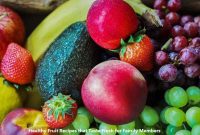Cholesterol is a fatty substance produced by the liver and is essential for various bodily functions. However, if cholesterol levels are high, blood flow can narrow and stop, potentially leading to a heart attack or stroke. Therefore, everyone must adopt the best diet for high cholesterol. If you have high cholesterol, start controlling your cholesterol levels by changing your diet and adopting a healthy lifestyle. This can certainly lower cholesterol and weight.

Some Foods for the Best Diet for High Cholesterol
A proper diet plays a crucial role in lowering high cholesterol levels. Below are some heart-healthy foods that maintain cholesterol levels.
Wheat
Eating a bowl of wheat for breakfast will provide 1-2 grams of soluble fiber. You can add strawberries or a banana for even more fiber. Consume at least 5 to 10 grams of soluble fiber daily. This aims to lower cholesterol levels. This soluble fiber can also help reduce the absorption of cholesterol into the bloodstream.
Grains
Next is grains. This is useful for reducing the risk of heart disease through its soluble fiber content. Whole grain foods can also be processed into pasta and whole wheat bread.
Nuts
Did you know that nuts take time to digest? Therefore, after eating them, you’ll feel fuller for longer. This is one reason why nuts can be a beneficial food for dieters. The best diet for high cholesterol is to add nuts such as almonds, kidney beans, black-eyed peas, and others.
These nuts can also protect the heart due to their nutritional content. Consuming 50 grams of nuts daily can slightly lower LDL. Users can add a handful of nuts to salads or eat them as a snack.
Vegetable Oil
Liquid vegetable oils, such as olive oil, contain unsaturated fatty acids. Users can use olive oil as a substitute for regular oil or butter. You can mix it with vinegar for salad dressing. Additionally, another benefit is that it can reduce the risk of a heart attack!
Fatty Fish
Next is fatty fish. This type of fish can lower triglycerides because it contains omega-3 fatty acids. Furthermore, it can reduce the risk of blood clots and high blood pressure. In fact, for people who have had a heart attack, consuming omega-3 fatty acids can reduce the risk of sudden death.
Because of their heart benefits, omega-3 fatty acids should be consumed at least two servings of fish per week. Omega-3 fatty acids don’t affect LDL cholesterol levels, but they can still increase HDL, the good cholesterol, and also lower triglycerides.
Furthermore, grilling fish can also help avoid adding unhealthy fats. Grilling is much better than frying. Several types of fish have the highest levels of omega-3 fatty acids, including salmon, mackerel, tuna, and herring.
Furthermore, canola oil, flaxseed, and walnuts also contain small amounts of omega-3 fatty acids. For convenience, fish oil and omega-3 supplements are also available. To ensure safe consumption, users should consult a doctor first.
Fruits and Vegetables
Low-calorie vegetables, such as okra and eggplant, are good sources of soluble fiber. Next, users should consume fruits rich in protein or soluble fiber, such as strawberries, grapes, bananas, apples, and oranges.
The NorthwellHealth1 YouTube channel emphasizes that the best diet recommendations for high cholesterol and heart health include the Mediterranean diet, a vegan diet, and a dietary approach aimed at stopping hypertension (the DASH diet). A healthy diet can also include consuming nuts, oats, and whole grains.
Which is more important? Lowering cholesterol or weight?
As previously explained, cholesterol is considered bad because it can lead to chronic disease. However, the human body needs cholesterol to stay healthy. Why? Of course, it’s needed to produce vitamin D and bile acids, which help digest dietary fats. However, high cholesterol levels can occur in someone who is obese. So, which should come first? Of course, losing weight through exercise and a healthy diet. Ultimately, the best diet for high cholesterol focuses on achieving ideal weight loss. /ame



